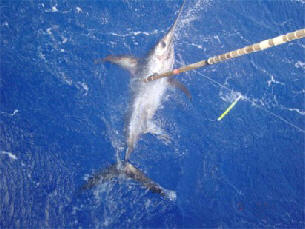|
Large fish are becoming scarce
2nd June 2003
Sea-River Newsletter Number 105
Canadian researchers estimate that over the last 20 years numbers of large fish have diminished by 80% throughout the oceans of the world. Industrial fishing is held responsible for overfishing, for lack of management of stocks and lack of consideration for the future.
80% of large fish have disappeared from the world’s oceans in 20 years. This is the conclusion of studies by R. Myers and B. Worm of the University of Dalhousie (Canada). These experts on marine biology have observed dramatic falls in the numbers of large fish: tuna, cod, swordfish, shark, ray, halibut, etc.
The two researchers have arrived at this
conclusion by studying over the last ten years
data on catches from vessels all over the world.
The numbers of large fish have diminished by 80
or 90%. This decrease is an overall trend and
concerns all species and all fishing zones.
The few blue marlins, which are left, do not have
much hope of reaching the size of their forebears
of the 1950s. Often they do not even have time
to reproduce once before they are caught.
Today Hemingway would not be able to write a
follow up to the old man and the sea for lack of
fish!
Industrial fishing is widely accused of being responsible: everywhere stocks are falling dramatically. Who would have thought that one day we would have to limit catches of cod and herring which have fed generations of human beings. For larger species the consequences are even worse. Repeated fishing with nets in reproduction zones has decimated populations. Leisure fishing has largely contributed to the creation of protected zones which give fish time to reproduce.
Philippe Cury from the Institute of Research and Development states, “it is no longer fishing but war”. War against fish, the innocent victims, and between fishing fleets to make their expeditions profitable. For man to catch fish is not harmful to the ecosystem but to plunder the seas for short term advantage is quite another matter. In former times fishing was done with moderate means and it was a risky business. Nobody would want to complain about the safety improvements but, on the other hand, modern technology and powerful vessels mean that once a fish has been detected it is doomed.
Nobody wants to admit it’s time to stop!
So the fishing and overfishing goes on and on and in order to supply profitable markets it continues with no thought for the future. Sharks are even thrown back in the sea with their fins cut off. Some species of shark together with other fish are threatened with extinction. The ecological consequences are unpredictable. Sardines and anchovies have multiplied from lack of predators and have become bolder; they attack young fish from species which were their predators! There is no guarantee that man will grow in wisdom – sustainable development should also be applied to fishing – how can this be done over such enormous expanses. Perhaps observation techniques from space will come to the rescue by monitoring catches. Everyone must help. Short term improvements seem doubtful.
Top
|
